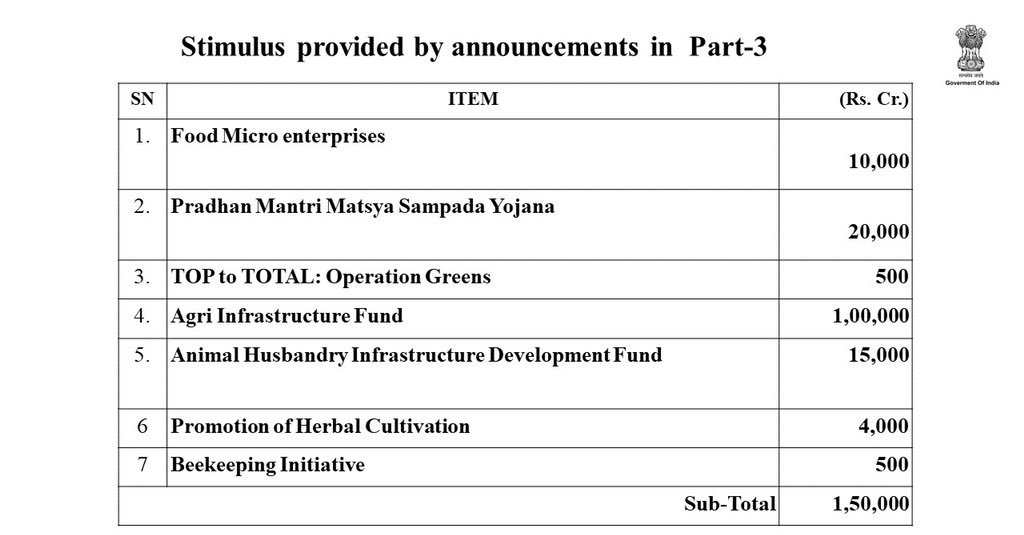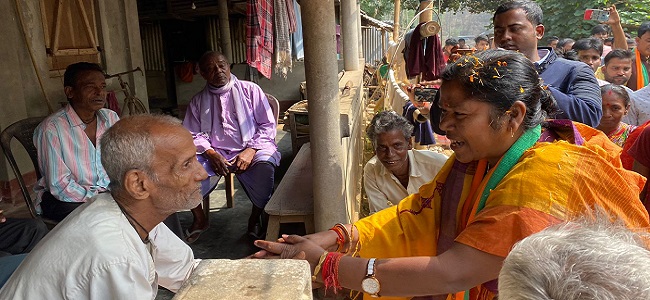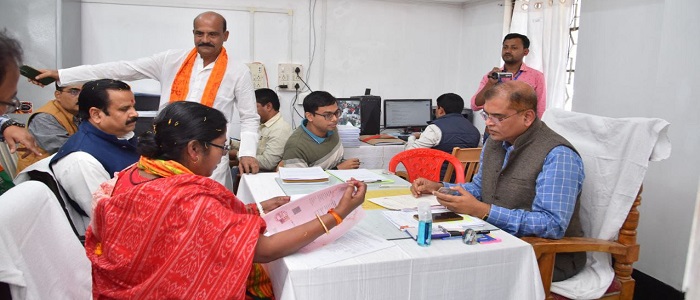New Delhi: Union Finance Minister Nirmala Sitharaman, in a press conference on Sunday, said that the focus of the fifth and final tranche of economic package will be on reforms and make the country more self-reliant. With a combination of several reforms, fiscal and liquidity measures, FM Nirmala Sitharaman completed the announcement of the last leg of the Rs. 20 lakh crore economic package announced by Prime Minister Narendra Modi. During the announcements on stimulus package to fight COVID-19 under Aatma Nirbhar Bharat Abhiyaan, the Union Minister of Finance & Corporate Affairs Smt. Nirmala Sitharaman referred to the vision laid out by Prime Minister Shri Narendra Modi in his address to the Nation on 12th May 2020.
Smt. Sitharaman said that in order to prove the resolve of Aatma Nirbhar Bharat, land, labour, liquidity and laws have all been emphasised in Aatma Nirbhar Bharat Package. The crisis and the challenge is an opportunity to build a self-reliant India.
The Finance Minister said the announcement is in continuation in the series of reforms. Soon after lockdown, we came up with Prime Minister Garib Kalyan Package (PMGKP). As part of the Rs 1.70 lakh crore PMGKP, the Government announced distribution of free food grains, cash payment to women and poor senior citizens and farmers etc. The swift implementation of the package is being continuously monitored. Around 41 crore poor people received financial assistance of Rs 52,608 crore under the PMGKP. The Finance Minister also said PMGKP used technology to do Direct Benefit Transfer (DBT) to people.
In addition, 84 lakh metric tonnes of food grains has been lifted by States and also more than 3.5 lakh metric tonnes of pulses has been dispatched to various States. And for this, Smt. Sitharaman appreciated the concerted efforts of FCI, NAFED and States, giving pulses and grains in huge quantities, despite logistical challenges.
She said the package would focus on seven steps that are being taken by the government with regard to reforms in MGNREGS, healthcare and education, businesses, de-criminalisation of the Companies Act, ease of doing business, public sector undertakings, and resources related to State government.
Announcing the 5th and last Tranche of measures towards Government Reforms and Enablers, Smt. Sitharaman detailed seven measures for providing employment, support to businesses, Ease of Doing Business, and State Governments as well sectors such as Education and Health.
Rs 40,000 crore increase in allocation for MGNREGS to provide employment boost: The Government will now allocate an additional Rs 40,000 crore under MGNREGS. It will help generate nearly 300 crore person days in total addressing need for more work including returning migrant workers in Monsoon season as well. Creation of larger number of durable and livelihood assets including water conservation assets will boost the rural economy through higher production.
Health Reforms & Initiatives: Public Expenditure on Health will be increased by investing in grass root health institutions and ramping up Health and Wellness Centres in rural and urban areas. Setting up of Infectious Diseases Hospital Blocks in all districts and strengthening of lab network and surveillance by Integrated Public Health Labs in all districts & block level Labs & Public Health Unit to manage pandemics. Further, National Institutional Platform for One health by ICMR will encourage research. And implementation of National Digital Health Blueprint under the National Digital Health Mission.
Technology Driven Education with Equity post-COVID: PM eVIDYA, a programme for multi-mode access to digital/online education to be launched immediately. Manodarpan, an initiative for psycho-social support for students, teachers and families for mental health and emotional well-being to be launched immediately as well. New National Curriculum and Pedagogical framework for school, early childhood and teachers will also be launched. National Foundational Literacy and Numeracy Mission for ensuring that every child attains Learning levels and outcomes in grade 5 by 2025 will be launched by December 2020.
Further enhancement of Ease of Doing Business through IBC related measures: Minimum threshold to initiate insolvency proceedings has been raised to Rs. 1 crore (from Rs. 1 lakh, which largely insulates MSMEs). Special insolvency resolution framework for MSMEs under Section 240A of the Code will be notified soon. Suspension of fresh initiation of insolvency proceedings up to one year, depending upon the pandemic situation. Empowering Central Government to exclude COVID 19 related debt from the definition of “default” under the Code for the purpose of triggering insolvency proceedings.
Decriminalisation of Companies Act defaults: Decriminalisation of Companies Act violations involving minor technical and procedural defaults such as shortcomings in CSR reporting, inadequacies in Board report, filing defaults, delay in holding of AGM. The Amendments will de-clog the criminal courts and NCLT. 7 compoundable offences altogether dropped and 5 to be dealt with under alternative framework.
Ease of Doing Business for Corporates: Key reforms include: Direct listing of securities by Indian public companies in permissible foreign jurisdictions. Private companies which list NCDs on stock exchanges not to be regarded as listed companies. Including the provisions of Part IXA (Producer Companies) of Companies Act, 1956 in Companies Act, 2013. Power to create additional/ specialized benches for NCLAT. Lower penalties for all defaults for Small Companies, One-person Companies, Producer Companies & Start Ups.
Public Sector Enterprise Policy for a New, Self-reliant India: Government will announce a new policy whereby – List of strategic sectors requiring presence of PSEs in public interest will be notified. In strategic sectors, at least one enterprise will remain in the public sector but private sector will also be allowed. In other sectors, PSEs will be privatized (timing to be based on feasibility etc.). To minimise wasteful administrative costs, number of enterprises in strategic sectors will ordinarily be only one to four; others will be privatised/ merged/ brought under holding companies.
Support to State Governments: Centre has decided to increase borrowing limits of States from 3% to 5% for 2020-21 only. This will give States extra resources of Rs. 4.28 lakh crore. Part of the borrowing will be linked to specific reforms (including recommendations of the Finance Commission). Reform linkage will be in four areas: universalisation of ‘One Nation One Ration card’, Ease of Doing Business, Power distribution and Urban Local Body revenues. A specific scheme will be notified by Department of Expenditure on the following pattern: Unconditional increase of 0.50%. 1% in 4 tranches of 0.25%, with each tranche linked to clearly specified, measurable and feasible reform actions. Further 0.50% if milestones are achieved in at least three out of four reform areas.
Earlier, the Finance Minister during her fourth announcement said that Prime Minister Shri Narendra Modi has very strong record in taking up deep systemic reforms citing Direct Benefit Transfer enabled giving money directly to people, GST brought in One Nation, One Market, Insolvency & Bankruptcy Code (IBC) resolved insolvency issues and steps taken for Ease of Doing Business.
Smt. Sitharaman outlined the need for Policy reforms to fast track investments and the steps taken by the Government in this regard. She stated that fast track clearance is being done through Empowered Group of Secretaries, a Project Development Cell would be set up in each Ministry to prepare investable projects and coordinate with investors and Central and State governments.
The Finance Minister announced the structural reforms in the eight sectors of Coal, Minerals, Defence Production, Civil Aviation, Power Sector, Social Infrastructure, Space and Atomic Energy.
Key highlights of the Day 4 announcements were: Commercial Mining introduced in Coal Sector, Diversified Opportunities in Coal Sector, Liberalised Regime in Coal Sector, Enhancing Private Investments and Policy Reforms in Mineral Sector, Enhancing Self Reliance in Defence Production, Policy Reforms in Defence Production, Efficient Airspace Management for Civil Aviation, More World-Class Airports through PPP, India to become a global hub for Aircraft Maintenance, Repair and Overhaul (MRO), Tariff Policy Reform in Power Sector; Privatization of Distribution in UTs, Boosting private sector investment through revamped Viability Gap Funding Scheme in Social Sector, Boosting private participation in space activities, Reforms in Atomic Energy Sector
Smt. Sitharaman also announced that a scheme will be implemented in States through challenge mode for Industrial Cluster Upgradation of common infrastructure facilities and connectivity. There will be availability of industrial land/land banks for promoting new investments and making information available on Industrial Information System (IIS) with GIS mapping. 3376 Industrial Parks/ Estates/SEZs in five lakh hectares are mapped on IIS. All Industrial Parks will be ranked during 2020-21.
During the final announcement, the Finance Minister said that the break-up of the total stimulus amounts to Rs. 20.97 lakh crore, and is as follows:
Revenue lost due to taxes since March 22: Rs. 7,800 crore
Pradhan Mantri Garib Kalyan Yojana: Rs. 1.7 lakh crore
Health: Rs. 15,000 crore
RBI measures: Rs. 8.01 lakh crore

The break-up of announcements made during all five tranches are as follows:
First tranche of the economic package was Rs. 594,550 crore

Second tranche of the economic package was Rs 310,000 crore

Third tranche of the economic package was Rs 150,000 crore

Fourth and Fifth tranches of the economic package amounts to Rs 48,100 crore








